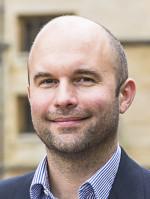
Professor of Molecular Informatics
Currently also: Chief Informatics and Technology Officer (CITO) at Pangea Botanica, London/UK and Berlin/Germany
Previous positions:
Director Digital Chemistry at NUVISAN Berlin
Associate Director Computational ADME and Safety (Clinical Pharmacology & Safety Sciences/Data Science and Artificial Intelligence - CPSS/DSAI) at AstraZeneca Cambridge
Co-founder of Healx Ltd.
Co-founder of PharmEnable Ltd.
- Committed to developing new life science data analysis methods (AI/ML/data science) and their application, primarily related to chemical biology, drug discovery and in silico toxicology
- Expertise comprises data ranging from chemical structure and gene expression data to phenotypic readouts and preclinical information, applied to both efficacy- and safety/tox-related questions
- Collaborating with academic research groups, as well as pharmaceutical, chemical, and consumer goods companies (Eli Lilly, AstraZeneca, GSK, BASF, Johnson&Johnson/Janssen, Unilever, ...)
- Co-founder/founding CTO and current SAB member of Healx Ltd. (data-driven drug repurposing for rare diseases, and beyond); co-founder of PharmEnable Ltd.; SAB member of Lhasa Ltd. (toxicology and metabolism prediction) and Cresset Ltd.
- Coordinator of the Computational & In Silico Toxicology Specialty Section of the British Toxicology Society (BTS)
- Steering Committee Member of the Cambridge Alliance on Medicines Safety (CAMS)
- Currently leading a group of ca. 15 PhD students, postdocs, project students and visitors at the Centre for Molecular Informatics at the University of Cambridge, https://www-cmi.ch.cam.ac.uk/centre-molecular-informatics
Publications
Chapter 5. Concepts and Applications of Conformal Prediction in Computational Drug Discovery
(2021)
2021-January,
63
(doi: 10.1039/9781788016841-00063)
Prediction of inotropic effect based on calcium transients in human iPSC-derived cardiomyocytes using novel waveform parameters and a modified random forest algorithm
– TOXICOLOGY LETTERS
(2021)
350,
S61
Cell morphology descriptors and gene ontology profiles improve prediction for mitochondrial toxicity
– TOXICOLOGY LETTERS
(2021)
350,
S81
Inferring longitudinal cascades of mechanistic events in drug-induced liver injury from transcriptomic and histopathology data using sequential pattern and rule mining
– NAUNYN-SCHMIEDEBERGS ARCHIVES OF PHARMACOLOGY
(2021)
394,
S18
Relating early cellular events to Drug-Induced Liver Injury (DILI) using time-resolved transcriptomic and histopathology data
– TOXICOLOGY LETTERS
(2021)
350,
S124
Systematic Analysis of Protein Targets Associated with Adverse Events of Drugs from Clinical Trials and Postmarketing Reports.
– Chemical research in toxicology
(2020)
34,
365
New Associations between Drug-Induced Adverse Events in Animal Models and Humans Reveal Novel Candidate Safety Targets
– Chemical Research in Toxicology
(2020)
34,
438
Artificial intelligence in drug discovery: what is realistic, what are illusions? Part 1: Ways to make an impact, and why we are not there yet.
– Drug discovery today
(2020)
26,
511
(doi: 10.1016/j.drudis.2020.12.009)
Comparison of Scaling Methods to Obtain Calibrated Probabilities of Activity for Protein-Ligand Predictions.
– J Chem Inf Model
(2020)
60,
4546
(doi: 10.1021/acs.jcim.0c00476)
Transcriptomics predicts compound synergy in drug and natural product treated glioblastoma cells.
– PLoS One
(2020)
15,
e0239551
(doi: 10.1371/journal.pone.0239551)
- <
- 8 of 41
